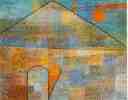for String Sextet
Program Notes

The
sextet Die Innere Grenze, scored for two violins, two
violas and two cellos, belongs to a larger cycle of
instrumental works. It is the third piece of the cycle,
which includes also: So er for twenty instruments,
and Lichtung for ten instruments. The formal
conception of the three works is centered around a similar
idea which was developed in various ways in the cycle: in
each case the musical material on which the piece is built
is not expressed at the beginning, but appears only at the
end. The origin of each work is thus progressively
"revealed", as the piece comes to a close. To this fairly linear process I have added in the sextet
another dimension by inserting at specific points excerpts
from a piece I wrote several years before, my string trio.
The structural and formal organization of the trio had
nothing to do with that of the sextet. The fragments of the
trio underwent several types of transformation, from simple
ones which did not alter their basic identity, to complex
ones which destroyed any chance to recognize the original in
them. Because of the widely changing aspects fo the
fragments, it is very difficult to put them in relation
while listening to the sextet. They do not seem to form a
unified whole, because their character varies considerably
from one occurence to the next. As opposed to a polyphonic
line which comes to the surface then disappears again in the
texture, and relies on its own identity to be recognized
when it comes back again, the fragments form a highly
irregular, constantly changing surface. This double organization is in its complexity an image of
a problem with which I have been concerned since I started
the cycle: how far can one go in the refusal of a type of
structural organization where all the elements are closely
related to each other - where the form can be perceived as
unitary - before the result becomes chaos and the form
totally ungraspable by the listener. I believe this problem
to be a central one in the music of our time. Die Innere Grenze was written for the Schoenberg
Sextet and is dedicated to Maryvonne le Dizès
![]()